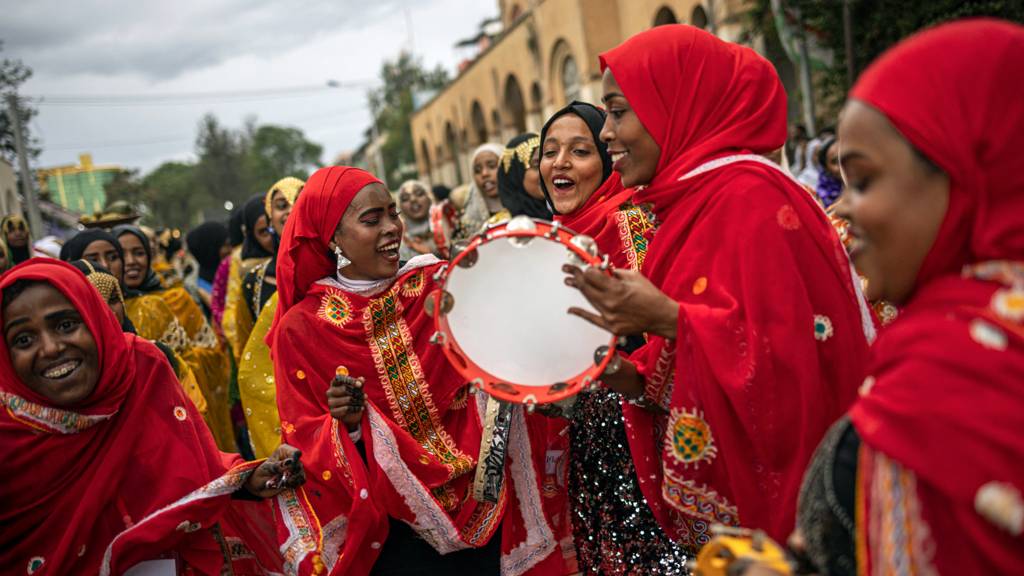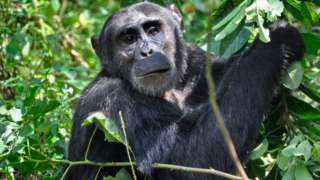
Live
Africa news updates from the BBC
viewing this page
Bringing you the latest news from around Africa at bbc.com/africalive. This is an automated feed.

Bringing you the latest news from around Africa at bbc.com/africalive. This is an automated feed.
Live Reporting
This is an automated feed
All times stated are UK
Get involved













AFPCopyright: AFP 
University of Stirling/University of Wisconsin-MadisonCopyright: University of Stirling/University of Wisconsin-Madison Chimps were found eating dung from inside a hollowed-out treeImage caption: Chimps were found eating dung from inside a hollowed-out tree 

Getty ImagesCopyright: Getty Images Large-scale ruby mining began in Mozambique around 14 years agoImage caption: Large-scale ruby mining began in Mozambique around 14 years ago 
Getty ImagesCopyright: Getty Images Help from international troops has not been enough to stop a worsening problemImage caption: Help from international troops has not been enough to stop a worsening problem 
Getty ImagesCopyright: Getty Images Plastic waste is a scourge around the worldImage caption: Plastic waste is a scourge around the world 

BBCCopyright: BBC - Niger, Mali and Burkina Faso to form joint force to fight jihadists
- The coups that promised - and failed - to bring safety

Latest PostGovernment expects Rwanda legal challenges - minister
By Sam Francis
Political reporter, BBC News
The illegal migration minister says small boat crossings will not stop until flights to Rwanda "kick in".
Read moreChinese shop shut for allegedly barring Nigerians
By Mansur Abubakar & Gloria Aradi
BBC News, Kano & Nairobi
The consumer protection agency has summoned the owner in its investigation into racism allegations.
Read moreIndian Sharma to coach Uganda at T20 World Cup
Uganda appoint Abhay Sharma as head coach of their men's side on a three-year deal before the T20 World Cup.
Read moreWhat is the UK's plan to send asylum seekers to Rwanda?
The UK government has passed new legislation to let it send some asylum seekers to Rwanda.
Read moreRwanda bill to become law after late-night showdown
By Jennifer McKiernan & Ben Wright
BBC News
Parliamentary stand-off ends, opening the way for asylum seekers to be sent to the African country.
Read moreRwanda bill passage draws election dividing line
By Chris Mason
Political editor, BBC News
Ministers believe the novel deportation scheme is worth a try, but Labour plans to get rid of it.
Read moreCould House of the Dragon star change the face of gaming?
By Andrew Rogers & Tom Richardson
BBC Newsbeat
Abubakar Salim set up his own studio to tell a personal tale of grief inspired by his Kenyan heritage.
Read moreZuma scores court hat-trick over South Africa election
By Rafieka Williams & Lucy Fleming
BBC News, Johannesburg
How the country's former president is thwarting attempts to bar him from contesting the polls.
Read moreWhy a plane to Rwanda won’t be taking off anytime soon
By Dominic Casciani
Home and legal correspondent
The Rwanda bill has finally been approved - but planes won't be taking off imminently.
Read moreHope Hostel in Rwanda says it's ready for first migrants from UK
By Barbara Plett Usher
BBC Africa correspondent, Rwanda
Rwanda is gearing up to welcome deported asylum seekers now the landmark UK bill has passed.
Read moreDeforestation pushes animals to eat virus-laden bat poo
By Wedaeli Chibelushi & Natasha Booty
BBC News
The creatures shed light on how new viruses might spread from animals to humans, researchers say.
Read moreScroll down for Monday's stories
We're back on Wednesday morning
That's all from the BBC Africa Live team for now. To keep up with news from the continent, visit the BBC Africa webpage.
And if audio is your thing, have a listen to the BBC's Focus on Africa and Africa Daily podcasts.
A reminder of Monday's wise words:
Click here to send us your African proverbs.
And we leave you with this photo of jockey Michael Fundiand after winning the Lord Macmillan Trophy in Kenya on the gelding Assured:
Danger to humans as habitat loss pushes animals to eat bat poo
Will Ross & Natasha Booty
BBC News
Scientists say they have found evidence that changes in animal behaviour caused by damage to forests can lead to wildlife and humans being exposed to dangerous viruses.
A study led by Stirling and Wisconsin-Madison Universities focused on a forest in western Uganda where palm trees have become extinct as a result of people using them to dry tobacco leaves.
Scientists filmed chimpanzees and antelope finding an alternative source of minerals in bat excrement.
But tests found this contained several viruses including one related to the virus that caused the Covid-19 pandemic.
"About a quarter the 27 viruses we identified were viruses of mammals - the rest were viruses of insects and other invertebrates," Prof Tony Goldberg told the BBC.
"All 27 viruses were new to science, so we don't know what effects they might have on humans or other animals. But one virus stood out because is was a relative of a virus everyone knows: SARS coronavirus 2."
Researchers hope their findings could help understand and prevent the onset of outbreaks, epidemics and pandemics including coronaviruses and possibly Ebola.
Miners hijack ruby works in Mozambique pay dispute
Jose Tembe
BBC News, Maputo
A group of 100 workers at a ruby mine have blocked the entrance to the gem-washing facilities, forcing work to come to a halt.
The ruby mine is owned by a company called Fura and is located in Montepeuz in northern Mozambique. The people who work there are employed by a logistics firm called Reef.
The workers say their employer owes them more than $265,000 (£215,000) in unpaid wages over the past three months.
But a Reef management representative says they have already tried to negotiate the debt with Fura to no avail. Fura has not yet commented on the claims.
Large-scale ruby mining began in Mozambique around 14 years ago.
UK's Rwanda deportation policy hangs in balance
Elettra Neysmith
BBC World Service News
The UK's lower house of parliament is again debating the government's flagship bill which seeks to send some asylum seekers to Rwanda.
The bill has been repeatedly blocked and amended since January.
Prime Minister Rishi Sunak has pledged that one-way flights will begin setting off for Rwanda in July.
He said he was determined that the latest part of the policy would finally be approved in parliament later.
The plan is designed to deter the record number of migrants arriving from France in small boats but it's been beset by legal challenges.
Polls suggest majority support for the policy but critics say it's morally wrong and expensive.
Summit seeks African solutions to terror threat
Chris Ewokor & Will Ross
BBC News
A counter-terrorism summit is under way in the Nigerian capital, Abuja, aimed at improving West Africa's response to the threat from Islamist militant groups.
Nigeria’s National Security Adviser, who organised the two-day event, said it aimed to focus on finding African-led solutions to the insecurity.
In recent years jihadist groups have increased their attacks across the Sahel region despite the presence of thousands of international troops.
Three countries worst affected by the violence - Mali, Burkina Faso and Niger - have not sent officials to the summit.
They are all under military rule following coups - a situation which has strained relations with other nations in the region.
Kenya bans plastic bags for organic rubbish
Kenya is bringing in a ban on people using plastic bags to dispose of their organic waste, burnishing the country's status as a global leader in the fight against plastic pollution.
It comes seven years after the East African nation banned single-use plastic bags.
The country's environmental agency says residents and local authorities now have three months to prepare for the changes before they will be enforced.
News of the changes were widely circulated to the public on Monday but, according to the statement sent out, they had first been issued on 8 April.
Islamists kidnap 100 civilians in Mali - reports
Will Ross
Africa editor, BBC World Service
There are reports from Mali that at least 100 civilians are being held by suspected jihadists after being kidnapped last week.
Local residents told the AFP news agency that they were travelling in three buses when the attackers forced them to drive in the direction of a forest between Bandiagara and Bankass.
Six days on, there has been no sign of the dozens of hostages.
This area of Mali's Mopti region has seen frequent attacks by Islamist fighters.
Following several recent attacks in the area, people are getting increasingly frustrated.
Civil society organisations in Bandiagara have been staging protests denouncing the fact that many people have been displaced and calling for a military camp to be set up to protect the local communities.
Following a coup in 2021, Mali's military rulers ordered thousands of international troops to pull out leaving the country even more fragile.
Jihadist attacks began in northern Mali more than a decade ago and have spread to the centre of the country as well as neighbouring Burkina Faso and Niger.
This prompted military coups in all three nations.
More on this topic:
Anglo American vows to oppose Zambia lead poisoning lawsuit
Mining giant Anglo American said on Monday that it would oppose any appeals by a group of Zambian women and children who are suing it for alleged mass lead poisoning.
The Johannesburg High Court had on Friday allowed the claimants to appeal against an earlier ruling that threw out their class action lawsuit against Anglo American South Africa (AASA).
The lawsuit claims that more than 140,000 people may have been poisoned, over generations, by exposure to toxins from a lead mine in Zambia's Kabwe district, where AASA was a shareholder from 1925 to 1974.
Anglo American said "it has every sympathy for the situation in Kabwe, but is not responsible for it".
A joint statement by Mbuyisa Moleele Attorneys and Leigh Day, the law firms representing the claimants, said the ruling was a "crucial step towards achieving justice" for the women and children.
The Johannesburg High Court judge Justice Leonie Wendell said that there were "compelling reasons to grant the appeal" and that the appeal had "reasonable prospects of success", the lawyers said in a statement on Monday.
They added that the claimants had "clear" evidence to support their allegations.
"From the early 1970s children were already falling ill and dying of lead poisoning, and a high proportion of them were suffering from massive blood lead levels."
The case is now expected to go to South Africa's Supreme Court of Appeal later this year.
Match off after row over map of Morocco on shirt
A continental football game in Algeria is called off after a dispute over a shirt featuring an extended map of Morocco.
Read more